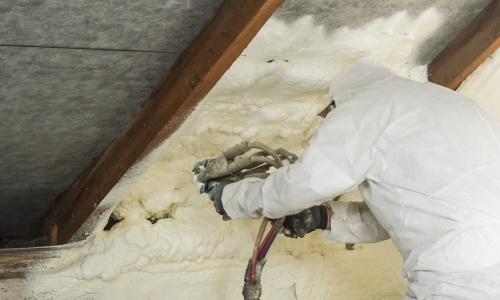All About Closed-Cell Spray Foam Insulation

Open-cell foam insulation is an extremely popular insulation option for homes, businesses, and other buildings across the United States. And if you know much about foam insulation, then you can see why. Thanks to its high R-value, sound-dampening properties, and exceptional air-sealing capabilities, it’s no wonder that spray foam is a top choice for home and commercial insulation. But did you know there’s another foam insulation that can give you unique benefits?
Closed cell spray foam insulation is an affordable, effective insulation that offer distinct advantages that open cell insulation just can’t. In fact, more and more people are making the switch each year, and once you understand its benefits, it’s easy to see why. Today, we’re highlighting the many benefits of closed cell spray foam insulation for your home!
Higher R-Value for Better Insulation
When it comes to thermal performance, closed cell foam insulation outperforms open-cell foam by a significant margin. While open-cell foam has an r-value of roughly 3.75 per inch, closed cell foam insulation nearly doubles that, providing incredible thermal insulation during even the coldest months.
If your goal is maximum energy efficiency and temperature control, closed cell foam insulation is the clear winner. Its high r-value ensures superior insulation, reducing energy costs and keeping your space comfortable year-round.
Protection from Moisture and Water Vapor
While traditional open-cell foam insulation serves as an excellent air barrier, it lacks resistance to moisture and vapor due to its “open” cells that allow in contaminants. By contrast, closed cell foam insulation is completely moisture-impermeable, preventing liquids from passing through. Though we wouldn’t advise it, spraying water on one side of your closed cell insulation would still leave the other side bone-dry.
We attribute closed cell insulation’s moisture resistance to its tightly packed cellular structure, which forms a dense, solid barrier. Unlike open-cell insulation, where air pockets allow moisture infiltration, closed cell foam insulation effectively seals out water—helping to prevent mold growth and structural damage.
Resistance and Resilience in the Long Run
Open-cell foam insulation is a flexible and soft material that can be molded or even torn away (though we don’t expect you’ll be doing that). While this has advantages in certain applications, it also makes it more vulnerable to certain types of damage. That said, most homeowners are very unlikely to cause direct damage.
You see, closed cell foam insulation is exceptionally durable, with a rigid structure that can withstand impacts. This makes it the ideal choice for areas where insulation might risk frequent contact, such as garages, warehouses, attics, or high-traffic spaces.
Request Your Closed Cell Foam Insulation Today
Are you searching for affordable and effective insulation, moisture resistance, and durability for your home or business? If so, then closed cell foam insulation may be the perfect choice for you. To schedule insulation services for your home or other building, click here to contact the experts at Spartan Insulation for more information!


